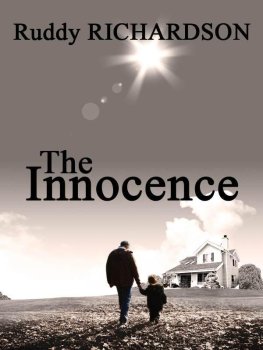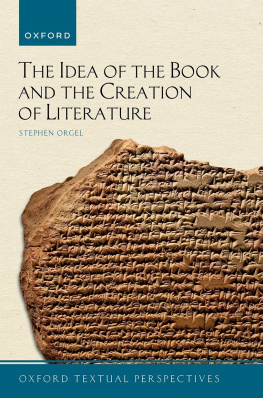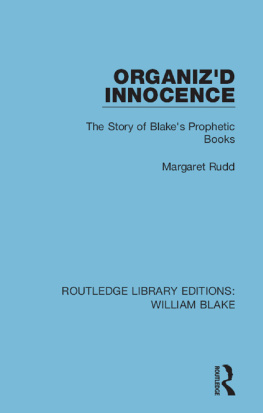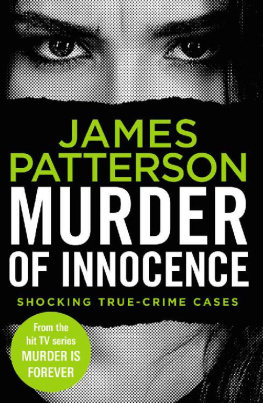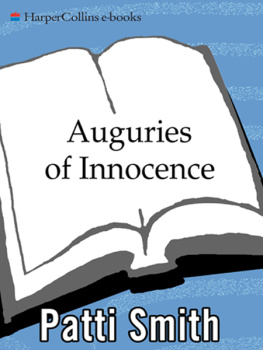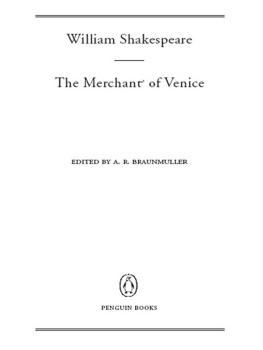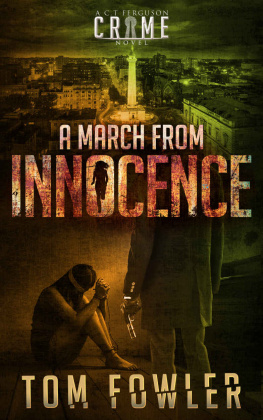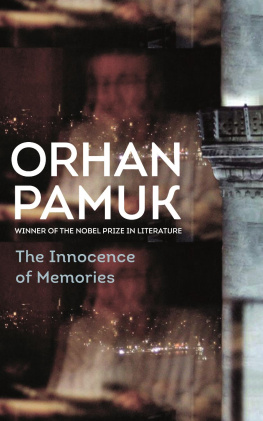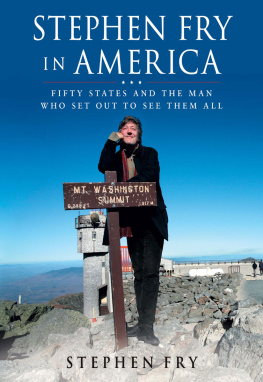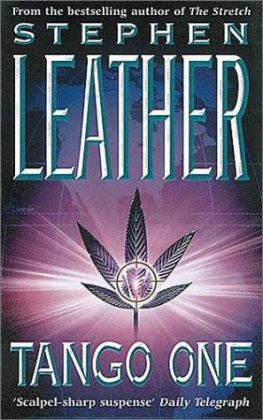Orgel Stephen - The age of innocence
Here you can read online Orgel Stephen - The age of innocence full text of the book (entire story) in english for free. Download pdf and epub, get meaning, cover and reviews about this ebook. City: UK;Oxford, year: 2008;2006, publisher: Oxford University Press, genre: Non-fiction. Description of the work, (preface) as well as reviews are available. Best literature library LitArk.com created for fans of good reading and offers a wide selection of genres:
Romance novel
Science fiction
Adventure
Detective
Science
History
Home and family
Prose
Art
Politics
Computer
Non-fiction
Religion
Business
Children
Humor
Choose a favorite category and find really read worthwhile books. Enjoy immersion in the world of imagination, feel the emotions of the characters or learn something new for yourself, make an fascinating discovery.

- Book:The age of innocence
- Author:
- Publisher:Oxford University Press
- Genre:
- Year:2008;2006
- City:UK;Oxford
- Rating:5 / 5
- Favourites:Add to favourites
- Your mark:
- 100
- 1
- 2
- 3
- 4
- 5
The age of innocence: summary, description and annotation
We offer to read an annotation, description, summary or preface (depends on what the author of the book "The age of innocence" wrote himself). If you haven't found the necessary information about the book — write in the comments, we will try to find it.
The age of innocence — read online for free the complete book (whole text) full work
Below is the text of the book, divided by pages. System saving the place of the last page read, allows you to conveniently read the book "The age of innocence" online for free, without having to search again every time where you left off. Put a bookmark, and you can go to the page where you finished reading at any time.
Font size:
Interval:
Bookmark:
OXFORD WORLDS CLASSICS
THE AGE OF INNOCENCE
EDITH WHARTON was born into Old New York Society in 1862, with impeccable social credentials and financial security. Her early years alternated between houses in Newport and Manhattan (its geographical boundaries demarcated by Washington Square and Central Park, its social spine formed by Fifth Avenue). Although Wharton started writing verses and stories as a child, her first attempts at professional authorship were delayed until 1889. A further decade passed before she broke into the literary scene with a collection of short stories in 1899 and the appearance in 1902 of The Valley of Decision. It took The House of Mirth to make Whartons fame upon its publication in 1905. Until her death in 1937, Wharton published on an annual basis novels, novellas, poetry, essays, and travel literature. Besides The House of Mirth, her best-known novels are Ethan Frome (1911), The Reef (1912), The Custom of the Country (1913), Summer (1917), and The Age of Innocence (1920) for which she received the Pulitzer Prize. In 1885 she married Edward (Teddy) Wharton, a childless union that rapidly proved unsuitable, though they did not divorce until 1913. After years of residing in Newport, New York, and The Mount in Lenox, Massachusetts, Wharton moved permanently to France in 1910. During the First World War Wharton was active in refugee work; this era is reflected in several novels, stories, and essays. She died in 1937 and is buried in Versailles.
STEPHEN ORGEL is the Jackson Eli Reynolds Professor in Humanities at Stanford University. His most recent books are Imagining Shakespeare (2003), The Authentic Shakespeare (2002), and Impersonations: The Performance of Gender in Shakespeares England (1996). His editions include Whartons The Custom of the Country and Miltons Paradise Lost (with Jonathan Goldberg) for Oxford Worlds Classics, Marlowes poems and translations, Ben Jonsons masques, The Tempest and The Winters Tale in the Oxford Shakespeare, and Macbeth, King Lear, Pericles, The Taming of the Shrew, and The Sonnets in the New Pelican Shakespeare, of which he is general editor.
OXFORD WORLDS CLASSICS
For over 100 years Oxford Worlds Classics have brought readers closer to the worlds great literature. Now with over 700 titlesfrom the 4,000-year-old myths of Mesopotamia to the twentieth centurys greatest novelsthe series makes available lesser-known as well as celebrated writing.
The pocket-sized hardbacks of the early years contained introductions by Virginia Woolf, T. S. Eliot, Graham Greene, and other literary figures which enriched the experience of reading. Today the series is recognized for its fine scholarship and reliability in texts that span world literature, drama and poetry, religion, philosophy and politics. Each edition includes perceptive commentary and essential background information to meet the changing needs of readers.
Refer to the to navigate through the material in this Oxford Worlds Classics ebook. Use the asterisks (*) throughout the text to access the hyperlinked Explanatory Notes.
OXFORD WORLDS CLASSICS

EDITH WHARTON

Edited with an Introduction and Notes by
STEPHEN ORGEL


Great Clarendon Street, Oxford OX2 6DP
Oxford University Press is a department of the University of Oxford.
It furthers the Universitys objective of excellence in research, scholarship,
and education by publishing worldwide in
Oxford New York
Auckland Cape Town Dar es Salaam Hong Kong Karachi
Kuala Lumpur Madrid Melbourne Mexico City Nairobi
New Delhi Shanghai Taipei Toronto
With offices in
Argentina Austria Brazil Chile Czech Republic France Greece
Guatemala Hungary Italy Japan Poland Portugal Singapore
South Korea Switzerland Thailand Turkey Ukraine Vietnam
Oxford is a registered trade mark of Oxford University Press
in the UK and in certain other countries
Published in the United States
by Oxford University Press Inc., New York
Introduction, Explanatory Notes Stephen Orgel 2006
Chronology Martha Banta 1994
The moral rights of the author have been asserted
Database right Oxford University Press (maker)
First published as an Oxford Worlds Classics paperback 2006
All rights reserved. No part of this publication may be reproduced, stored in a retrieval system, or transmitted, in any form or by any means, without the prior permission in writing of Oxford University Press, or as expressly permitted by law, or under terms agreed with the appropriate reprographics rights organization. Enquiries concerning reproduction outside the scope of the above should be sent to the Rights Department, Oxford University Press, at the address above
You must not circulate this book in any other binding or cover
and you must impose this same condition on any acquirer
British Library Cataloguing in Publication Data
Data available
Library of Congress Cataloging in Publication Data
Data available
Typeset in Ehrhardt
by RefineCatch Limited, Bungay, Suffolk
Printed in Great Britain by
Clays Ltd., St. Ives plc
ISBN 0192806629 9780192806628
1
I am indebted to Michael Wyatt for information, for a series of energetic conversations about Wharton, and for providing the ideal setting, Florence, where this edition was completed. Villa I Tatti, where Wharton paid many visits to her dear friend Bernard Berenson, was as warmly welcoming to me as it had been to her, and I thank Joseph Connors, the director, for his hospitality, and the librarian and staff for their manifold kindnesses. Leonard Barkan gave me the benefit of his expertise to illuminate a viticultural point. Judith Luna has once again been the ideal editor.
The Age of Innocence was Edith Whartons first novel after the end of the First World War. Settled in Paris since 1910, she had been intensely active in war work throughout the conflict, and her admiration for her adopted country was immense and unqualified. But with victory came the growing realization that the war had changed her own world for good. The Paris she had loved, that had served her as a refuge from the materialism of her own country and the miseries of her marriage, a culture rich in emotional, spiritual, and sensual satisfactions, she now found transformed beyond recognition. It was, she wrote to her friend Bernard Berenson in 1919, simply awfula kind of continuous earthquake of motors, busses, trams, lorries, taxis and other howling and swooping and colliding engines, with hundreds of thousands of U.S. citizens rushing about in them and tumbling out at ones door. The fact that the chief agent of change in this account is U.S. citizens gives her sense of her own place in the events of the past five years a particular poignancyin working to save France from the barbarians she has helped to Americanize it. She had determined, even before the wars end, to leave Paris and find a place in the country. The house, in the village of Saint-Bricesous-Fort in the northern suburbs of Paris, required much restoration, and finally became her principal home in 1919. In moving there she was escaping from herself as much as from her unwelcome compatriots; and it is not coincidental that her imagination turned to the reconstruction of a past that was uniquely her own and gave her an opportunity not to remake her history, but to contemplate how she came to be herself.
Next pageFont size:
Interval:
Bookmark:
Similar books «The age of innocence»
Look at similar books to The age of innocence. We have selected literature similar in name and meaning in the hope of providing readers with more options to find new, interesting, not yet read works.
Discussion, reviews of the book The age of innocence and just readers' own opinions. Leave your comments, write what you think about the work, its meaning or the main characters. Specify what exactly you liked and what you didn't like, and why you think so.

